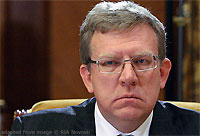Kudrin Criticizes Prevalence of Social, Military Spending in Budget

MOSCOW. Oct 15 (Interfax) – International Expert Council for Russia Chairman Alexei Kudrin said at a World Economic Forum session, attended by Russian Prime Minister Dmitry Medvedev, that the prevalence of social and military spending in the Russian budget had its shortcomings.
“It was noted (during discussions on Sunday) that the structure of the budget was weak and that there was an insufficient increase in resources for education, healthcare and infrastructure because there is a prevalence of social and military spending,” Kudrin said Sunday.
The World Economic Forum session noted the positive impact on the Russian economy of the WTO and planned accession to the OECD, Kudrin said.
It was also said that the high price of oil in previous years had reduced the stimulus for establishing institutions, however now increasing the work of institutions was the only way forward for further development, he said.
“Among the most important challenges is the danger, in the case of adverse scenarios, of more government influence on the economy, the creation of new government corporations that will supplant market mechanisms,” Kudrin said.
Another risk is a considerable drop in the oil price, which will lead to a drop in average incomes for the population. “Thus, timely reforms are an important factor for stability in the future,” he added.
The structure of the three-year budget is unlikely to stand much change, but in the future the government can find a balance between military and social sending and spending on education and healthcare.
“This budget has already been presented and in this budget it will be very difficult to reduce spending on social problems or military needs much. So for now in the next three years we have, in essence, an imperfect scenario in terms of structure,” Kudrin told Interfax when asked whether his criticism will have practical consequences.
“This is not my criticism; it is the opinion of the experts that have gathered here. I think this will be reported to the government more than once,” Kudrin said after the World Economic Forum session.
Medvedev said “the recommendations that were compiled, about which Alexei Kudrin spoke, should certainly be used.”
Earlier, when he was the Russian president, Medvedev sacked Kudrin who was deputy prime minister and finance minister, after he criticized the increase in military spending.
Following the work of the International Expert Council for Russia, Kudrin told the press that he was grateful to the prime minister for participating in the session.
“I am very grateful that the government responded. Today many members of the government and Prime Minister Dmitry Anatolyevich Medvedev attended the Council for Russia at the World Economic Forum meeting. This means the success of another economic platform, which will help find ways to resolve the most relevant problems,” Kudrin said.
Asked whether there was any tension between himself and the prime minister, Kudrin said “I think the meeting was completely business-like, I did not feel any tension.”
Medvedev’s press secretary Natalia Timakova said Medvedev attended the World Economic Forum session on Kudrin’s invitation.
“Dmitry Medvedev attended today’s World Economic Forum session on: “Development of Russia in a global context,” by invitation from Alexei Kudrin.”
Timakova said contact between the prime minister and the former deputy prime minister is of a working nature “which is underlined by the prime minister’s participation in the session and his comments on Kudrin’s speech.”
